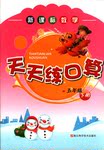题目内容
As a child, I was really afraid of the dark and of getting lost. These fears were very real and caused me some uncomfortable moments.
Maybe it was the strange way things looked and sounded in my own room at night that scared me so much. There was never complete darkness, but always a streetlight or passing car lights, which made clothes on the back of a chair take on the shape of a wild animal. Out of the corner of my eye, I saw the curtains seem to move when there was no wind. A very low sound in the floor would seem a hundred times louder than in the day. My imagination (想象) would run wild, and my heart would beat fast. I would lie very still so that the “enemy” would not discover me.
Another of my childhood fears was that I would get lost, especially on the way home from school. Every morning I got on the school bus right near my home. That was no problem. After school, though, when all the buses were lined up along the street, I was afraid that I would get in the wrong one and be taken to some other strange places. On school or family trips to a park or a museum, I wouldn’t let the leaders out of my sight.
Perhaps one of the worst fears of all I had as a child was that of not being liked or accepted by others. Being popular was so important to me then, and the fear of not being liked was a serious one.
One of the processes growing up is being able to realize and overcome our fears. Understanding the things that scared us as children helps us achieve greater success later in life.
1.The author had _______ kind(s) of fears when she was a child.
A.three B.two C.one D.none
2._______ would scare the author at night.
A.Wild animals and enemies
B.Moving curtains
C.A very low sound in the floor
D.Wild imagination
3.When she went to some other places, she would _______.
A.walk away without others
B.follow others closely
C.take a bus by herself
D.make sure not to take a wrong bus
4.Which of the following would be possibly true when she was a child
A.She was always the leader of the others.
B.She always got poor grades.
C.She thought being popular among people was important.
D.She was not liked by others at all.
 天天练口算系列答案
天天练口算系列答案
